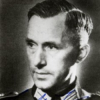Ernst Junger

Ernst Junger
Ernst Jüngerwas a highly decorated German soldier and author who became famous for his World War I memoir Storm of Steel. The son of a successful businessman and chemist, Jünger rebelled against an affluent upbringing and sought adventure in the Wandervogel, before running away to briefly serve in the French Foreign Legion, an illegal act. Because he escaped prosecution in Germany due to his father's efforts, Jünger was able to enlist on the outbreak of war. During an ill-fated German...
NationalityGerman
ProfessionWriter
Date of Birth29 March 1895
CountryGermany
Often I have the impression that I am writing on paper that is already browning in the licks of the flames.
The more the panic grows, the more uplifting the image of a man who refuses to bow to the terror.
Liberalism is to freedom as anarchism is to anarchy.
The (capital punishment) controversy passes the anarch by. For him, the linking of death and punishment is absurd. In this respect, he is closer to the wrongdoer than to the judge, for the high-ranking culprit who is condemned to death is not prepared to acknowledge his sentence as atonement; rather, he sees his guilt in his own inadequacy. Thus, he recognizes himself not as a moral but as a tragic person.
For the anarch, little is changed when he strips off a uniform that he wore partly as fool's motley, partly as camouflage. It covers his spiritual freedom, which he will objectivate during such transitions. This distinguishes him from the anarchist, who, objectively unfree, starts raging until he is thrust into a more rigorous straitjacket.
Although I am an anarch, I am not anti-authoritarian. Quite the opposite: I need authority, although I do not believe in it. My critical faculties are sharpened by the absence of the credibility that I ask for. As a historian, I know what can be offered.
The anarch knows the rules. He has studied them as a historian and goes along with them as a contemporary. Wherever possible, he plays his own game within their framework; this makes the fewest waves.
The political trend is always to be observed, partly as a spectacle, partly for one's own safety. The liberal is dissatisfied with regime; the anarch passes through their sequence - as inoffensively as possible - like a suite of rooms. This is the recipe for anyone who cares more about the substance of the world than its shadow - the philosopher, the artist, the believer.
Seen politically, systems follow one another, each consuming the previous one. They live on ever-bequeathed and ever-disappointed hope, which never entirely fades. Its spark is all that survives, as it eats its way along the blasting fuse. For this spark, history is merely an occasion, never a goal.
The anarch is oriented to facts, not ideas. He fights alone, as a free man, and would never dream of sacrificing himself to having one inadequacy supplant another and a new regime triumph over the old one. In this sense, he is closer to the philistine; the baker whose chief concern is to bake good bread; the peasant, who works his plow while armies march across his fields.
We do not escape our boundaries or our innermost being. We do not change. It is true we may be transformed, but we always walk within our boundaries, within the marked-off circle.
We had set out in a rain of flowers to seek the death of heroes. The war was our dream of greatness, power and glory. It was a man's work, a duel on the fields whose flowers would be stained with blood. There is no lovelier death in the world... Anything rather than stay at home, anything to make one with the rest.
The special trait making me an anarch is that I live in a world which I ‘ultimately’ do not take seriously. This increases my freedom; I serve as a temporary volunteer
The partisan wants to change the law, the criminal break it; the anarch wants neither. He is not for or against the law. While not acknowledging the law, he does try to recognize it like the laws of nature, and he adjusts accordingly.